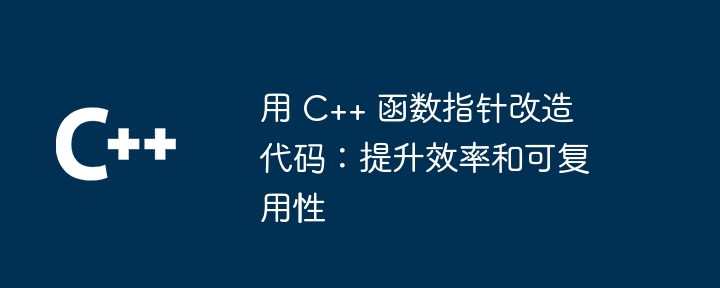函数指针技术可提升代码效率和可复用性,具体表现为:提升效率:使用函数指针可减少重复代码,优化调用过程。提高可复用性:函数指针允许使用通用函数处理不同数据,提高程序的可复用性。

用 C++ 函数指针改造代码:提升效率和可复用性
函数指针是一种强大的工具,它允许将函数作为一个参数传递给另一个函数。通过利用此功能,我们可以改造代码以提高其效率和可复用性。
提升效率
使用函数指针可以减少重复代码的数量。例如,我们有一个函数数组,其中每个函数都执行不同的计算:
double calculate1(double x) { return x * x; }
double calculate2(double x) { return x * x * x; }
double calculate3(double x) { return pow(x, 4); }现在,我们希望创建一个函数,可以根据给定的整数索引调用这些函数中的任何一个。传统方法是使用条件语句:
double calculate(int index, double x) {
if (index == 1) return calculate1(x);
else if (index == 2) return calculate2(x);
else return calculate3(x);
}使用函数指针,我们可以将函数数组存储在一个指针数组中:
double (*calculateFuncs[])(double) = {calculate1, calculate2, calculate3};然后,我们只需使用索引即可直接调用所需的函数:
double calculate(int index, double x) {
return calculateFuncs[index](x);
}这消除了对条件语句的需要,显著减少了代码量。
提高可复用性
函数指针还提高了可复用性。例如,我们可以创建一个通用的排序函数,可以根据给定的比较函数对数据进行排序:
void sort(int* arr, int size, bool (*compare)(int, int)) {
// 排序算法
}比较函数指定两个元素的排序方式。这允许我们使用不同的排序算法,例如冒泡排序或快速排序,而无需修改排序函数本身。
实战案例
让我们考虑一个实战案例,其中我们希望创建一个可以执行不同数学运算的计算器。
#include <iostream>
#include <vector>
#include <algorithm>
using namespace std;
<a style='color:#f60; text-decoration:underline;' href="https://www.php.cn/zt/58423.html" target="_blank">typedef</a> double (*FunctionPointer)(double);
vector<FunctionPointer> functions;
void registerFunction(FunctionPointer func) {
functions.push_back(func);
}
double calculate(int index, double x) {
return functions[index](x);
}
int main() {
registerFunction(calculate1);
registerFunction(calculate2);
registerFunction(calculate3);
double x;
int index;
cout << "Enter a number: ";
cin >> x;
cout << "Enter the function index (1-3): ";
cin >> index;
cout << "Result: " << calculate(index - 1, x) << endl;
return 0;
}此程序允许用户输入一个数字和一个函数索引,然后计算并输出结果。通过使用函数指针,动态注册和调用所需的函数,我们提高了代码的可复用性和效率。



